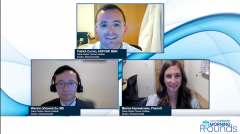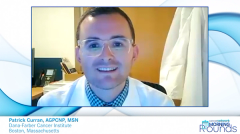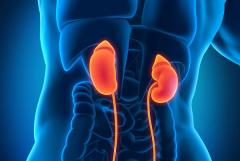
Tivozanib in Clear-Cell RCC: Adverse Event Management Strategies
Perspectives on the adverse events and management of tivozanib, covering common and serious toxicities with an emphasis on a multidisciplinary approach to optimize patient care and treatment benefits.
Episodes in this series

Summary:
In discussing adverse events associated with tivozanib, one speaker highlights its favorable adverse effect profile, attributing most adverse effects to specific VEGF toxicities rather than off-target effects. Hypertension remains a predominant adverse event, accompanied by manageable occurrences of diarrhea, nausea, fatigue, and mucositis. However, one panelist underscores the potential serious but uncommon toxicities related to VEGF tyrosine kinase inhibitors (TKIs), particularly cardiovascular complications like cardiac failure, ischemic heart disease, thromboembolism, and wound healing issues.
To manage these adverse effects, panelists emphasize the importance of comprehensive patient care. Addressing fatigue involves assessing sleep quality, physical activity, and nutrition. If fatigue persists, a reevaluation of the drug dose and a short treatment break may be considered. Hand-foot syndrome prevention is crucial, involving the prophylactic application of urea-based creams and, if necessary, high-dose topical steroids or treatment breaks.
Multidisciplinary collaboration is crucial in managing adverse effects. One speaker suggests involving nephrology colleagues for proteinuria concerns, dermatology experts for persistent hand-foot syndrome, and cardiology specialists for blood pressure management. Blood pressure monitoring at home, especially for patients with baseline hypertension, allows early intervention with medications like ACE inhibitors or angiotensin receptor blockers. This multidisciplinary approach optimizes adverse effect management, potentially enabling patients to stay on treatment comfortably for extended periods and derive maximal treatment benefits.
Summary is AI-generated and reviewed by Cancer Network editorial staff.
Newsletter
Stay up to date on recent advances in the multidisciplinary approach to cancer.










































